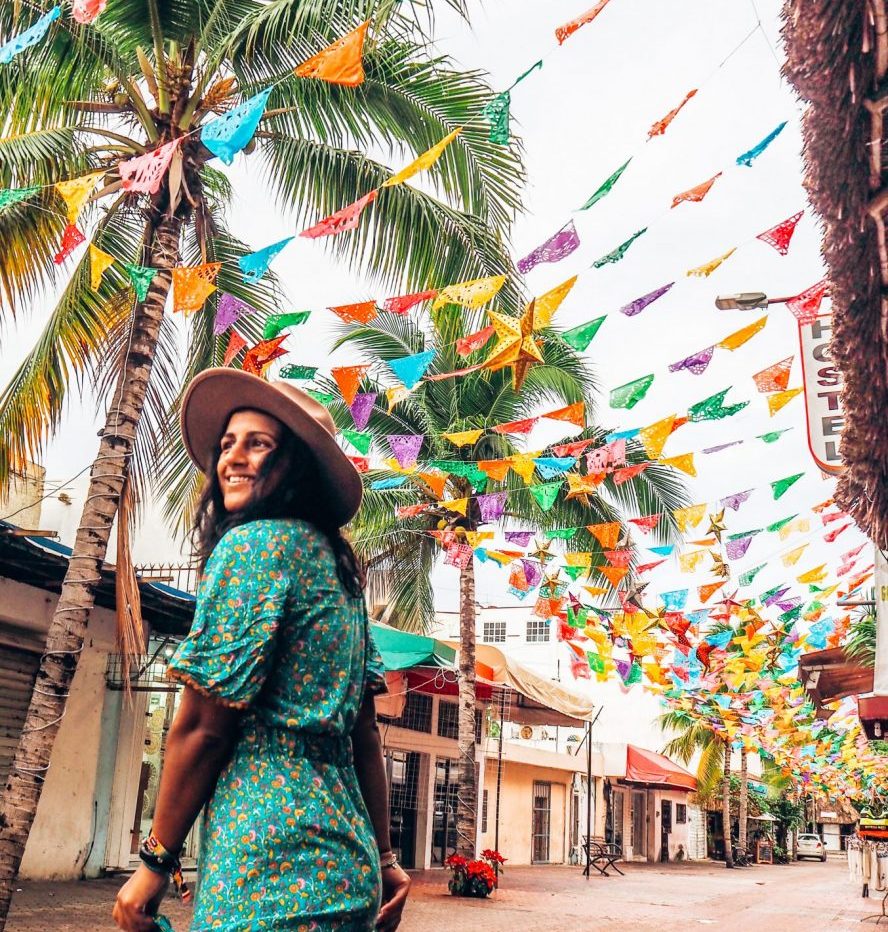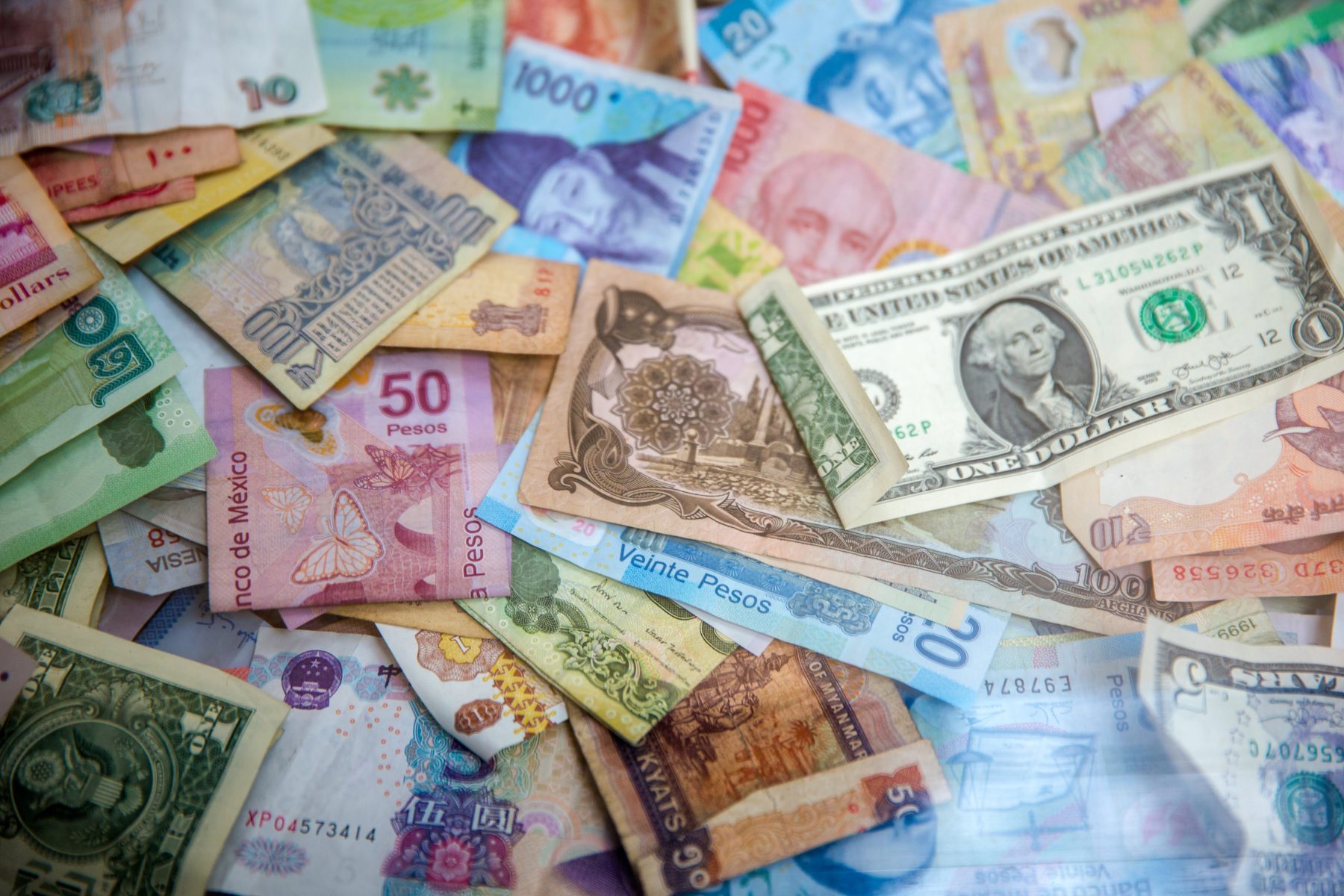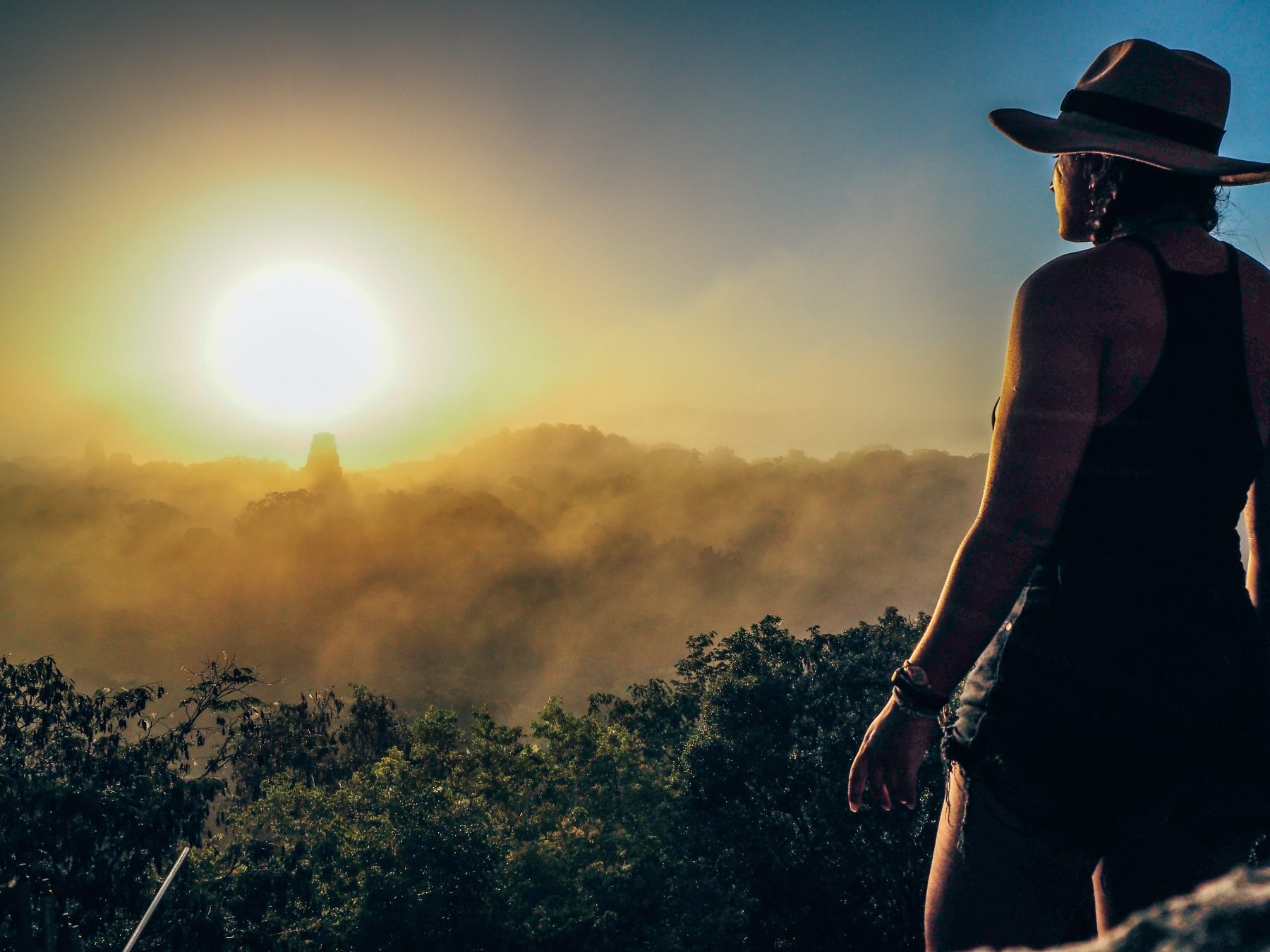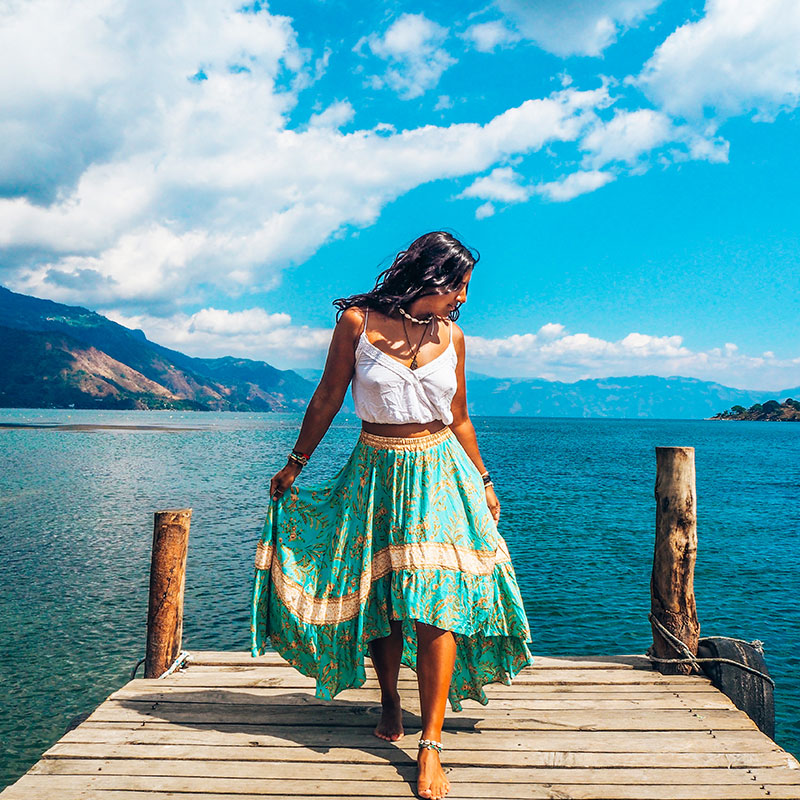One of the hardest things for many long-term travellers is developing healthy eating habits – and maintaining them – while on the road. For many, their weight fluctuates between bloated from too much fried food and cocktails. To super skinny after a bad bout of food poisoning. We've all been there – you have all these ideas about being tanned and looking great in a bikini. But when you're so busy making new friends, trying delicious foods and partying. It can be hard to find time to balance that with exercise. Over the years, I've gone from being curvy to skinny and back again. But in my six years of travel, I've finally found a balance that works for me. It took nearly 50 countries, but I've found a lifestyle that keeps me feeling happy. Now I'm healthy and most of all – strong and ready to take on the world.
Now I'm going to share what works for me. I hope it will help other backpackers and travellers to find a balance that works for them. Every body is different, and I'm not a nutritionist so I can't offer specific advice. But I will share my tried and tested methods that I have discovered over the years and which have worked well for me. I live a very active lifestyle – walking a lot each day, swimming and hiking regularly. So my diet has to maintain my energy levels. This is very important to me. I also love to enjoy food and dine out, trying different dishes when I travel. Food is a huge part of travel for me. So I don't believe in restricting your diet in order to stay fit and healthy. Instead I prefer to find a balance of healthy foods and treats.

Healthy eating habits for those without a routine
If you're someone who lacks routine and regularly flits between timezones – you might find these tips helpful. When I travel, I know the one constant is that I have no real schedule. Some days I go to bed late and sleep in, other days I get up at sunrise and go to bed early. So how I keep on top of this and try to create some schedule for my healthy eating habits is really important to me. Because even if I'm tired, I can still have lots of energy if I eat the right things.
Intermittent fasting
I've read a lot about intermittent fasting over the last few years – and it's funny because it was something I was already doing quite a lot without even realising. Basically the thinking behind it is to take long periods of time where you don't eat and instead allow the body to use up its reserves of energy. In Western society, we already eat far too much and don't give our bodies a chance to feel hungry. I don't do this all the time – but most days I will eat dinner at around 5-7pm and then won't eat after that until around lunchtime the following day. This includes around 8 hours of sleep (hopefully) and then I will have a late brunch to start the day.
This works really well for me as I often like to exercise in the morning and naturally wouldn't eat until after I had done that anyway. Instead I stick to water, fruit tea or coffee during these hours. Why do I do this? Because it actually gives me so much more energy and I also find myself eating more consciously.
Cutting back to two bigger meals a day
This naturally leads into another dietary choice I have made. Cutting back on the number of meals in exchange for larger meals and snacks. I find because of my usually busy schedule when travelling it makes sense not to break up activities to cram in another meal. Usually if I find myself hungry, I will get a snack from a street vendor or some fruit – try to focus on healthy snack instead of fried things. Then will wait until later to eat dinner with friends. I love to explore food markets or share a social dinner with friends and usually when travelling I will end up eating later – around 7-8pm sometimes.
I want to make it clear that I don't cut back on the amount of food I am eating overall – simply the times at which I am eating this food. My goal is not to be skinny, but to be healthy. This routine is one that not only fits well with different timezones and jet lag, but stops you missing meals and gorging yourself on unhealthy foods. Plus I find that when I do eat, I don't end up bloated or feeling overly-full.
Squeeze your vitamins into juices or smoothies
If you're struggling to get all of your 5 a day into your daily meals, or have limited options for fruit and veggies when you order meals. You could try getting a fresh fruit juice or smoothie each day. In Asia, Central America and South America these are easy and cheap to buy – plus it means you can squeeze 5x fruit/veg into one drink. If you're on a tight schedule, or simply don't want to order a healthy dinner that day, it can be a good way to refresh yourself while topping up your vitamins. I know when I was in Central America where the main foods centre around rice, beans, meat and plantain – I was getting a lot of vitamins in juice or smoothie form.

OLYMPUS DIGITAL CAMERA
Focus on health with these dietary tips
Cut back on meat/dairy products
If you want to know which of these healthy eating habits will have the biggest impact – this is the one. Over the last five years, I've gone through phases of cutting out meat, fish, dairy and animal products in varying amounts. I consider myself a flexitarian – I don't stick to any rules and my diet changes all the time depending on the country I am in and what food is available. But I've not eaten meat in several years and have cut most animal products out of my diet. It is one of the best decisions I have ever made – why?
I have more energy than I have ever had, my hair, skin and nails are super strong, I almost never get ill and most of all – I feel great. It makes me happy to know that I am healthy, reducing my carbon footprint and I'm not supporting the meat farming industry. You don't have to be perfect, you don't have to do it 24/7 or declare yourself vegan. But cutting back on animal products and meat will help you to feel much healthier. If your motivation is looking good in a bikini, I'm also the leanest and most toned I have ever been since starting to focus on a plant-based diet.
Focus on a plant-based diet
This one is not only super good for your body, but it's great for your bank balance! When travelling – many of the local cultures around the world focus their diets around basic staples. In Asia, it's rice, noodles, veggies and spice. Over in Central & South America, it's rice, beans, plantains. In Europe, it's potatoes and veggies whether in hearty, warming meals or Mediterranean fare. Or in parts of Africa, it's rice, lentils, veggies. All of these ingredients make up a plant-based diet which means it's a diet you can eat anywhere in the world.
It's simple, cheap and authentic local food which means you can eat the local dishes. But it also means you can eat cheap while staying healthy – most of these foods are widely available from street vendors. In comparison, Westernised food is much more unhealthy and focuses on sugary, doughy and fatty dishes. Nothing wrong with treating yourself and having a cheeky takeaway pizza if you fancy it, but it's all about balance and finding the right healthy eating habits.
Eat a variety of fruits and veggies
Making sure you are eating a healthy and balanced diet is important whether you eat meat, or are vegan. Don't forget that just because you're eating a plat-based diet, you still need to make sure you're eating a variety of food. One thing I struggled with in Central America was the vegan diet of rice, beans, plantain and avocado – I knew I wasn't getting enough vitamins and this is why I got sick when I was there. It's important to eat a range of greens, colourful fruits and veggies, plus lots of fibre and protein. If you're not getting enough of any of these food groups. It can weaken your immune system and make you more likely to get ill. Always remember to try and eat the rainbow. If you're not getting enough in restaurants – find a fruit & veg seller and get some snacks!

OLYMPUS DIGITAL CAMERA
Balance your lifestyle with these new tricks
Take into account how much alcohol you drink
This one can have a big impact on what your body does when you travel. Some people drink a lot and end up putting on weight and bloating from the fried food and unhealthy snacks they crave. Others drink a lot and end up losing weight because they don't get hungry. If you're partying a lot, it's important to try and balance this out with what you're eating. Every traveller goes through phases where they drink more and eat less, or when they stop drinking and eat more.
Find a healthy eating habits balance that works for you and balances out the amount of sugar that you are putting into your body. It also means accounting for your choice of drink – if you prefer beer or sugary cocktails, you are more likely to put on weight and feel bloated or sluggish. If you are drinking wine or spirits, I find you tend to feel the sugar crash less and don't get the fatty.sugar cravings afterwards. Take these things into account when figuring out a balance.
Make sure you're drinking enough water
This is super important if you're travelling hot countries. If you're not drinking enough water, thirst can manifest as hunger pangs and confuse the body into thinking you want food. I read somewhere that half the time when we think we're hungry, we're actually just thirsty. So make sure you're drinking plenty of water throughout the day. At least 2 litres and maybe more if you're walking around a hot country. If you're getting peckish, have a big drink of water before you eat, to see if that hunger goes away. Likewise – in the heat you can often lose your appetite. So make sure if this happens you are still eating enough.
Get a Fitbit or track your food/exercise ratio
If you're terrible at keeping track of what you're eating and drinking, or find it hard to balance. Why not try getting a Fitbit or food tracking app to log everything you eat and drink, plus your exercise? It might help to educate you on what you are putting in your body and what your exercise is burning off. Again I want to stress this is not about losing weight. More about maintaining a good level that is healthy for your body type and mindset. After all, when we look good, we feel good. Everyone wants that glowing skin and healthy hair, to feel comfortable on the beach. So this is a great way to keep track of yourself and figure out a balance of these healthy eating habits that works.
Make sure you are exercising daily – this makes a huge difference. I like to walk a lot around cities or hike trails – often clocking up 15,000+ steps a day. Plus swimming in the ocean, running or doing yoga. All of these make a big difference to my mindset and when I'm acting healthy, I want to eat healthy. It's easy to walk a lot when travelling and I see this as my main source of exercise but it's easy to increase. Start adding small exercises to your daily routine and you will reap the benefits. After all – food can make you gain or lose weight, but exercise will tone, it will build muscle and make you feel confident.
What healthy eating habits help you stay on track when you travel? Do you prefer to focus on food or exercise? How do you maintain a balance?













